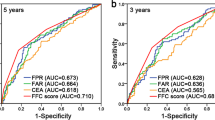Abstract
Background
For resectable advanced esophageal cancer, a transthoracic esophagectomy following preoperative treatment is recognized as one of the standard treatments. Therefore, predictive markers which can be identified before surgery need to be established to identify patients with a poor prognosis.
Methods
We retrospectively reviewed 102 consecutive patients who underwent curative transthoracic esophagectomy following preoperative treatment in our institution between 2004 and 2013. Based on plasma fibrinogen and serum albumin levels, the pretreatment and preoperative fibrinogen and albumin score (FA score) were investigated and the prognostic significance of the FA score change was compared with RECIST.
Results
The patients were classified according to whether the FA score had remained unchanged or decreased (n = 77) or the FA score increased (n = 25). When the correlation between the response rate and change in the FA score was investigated, the response rate was significantly lower in the group with the increased FA score. In the survival analysis, patients in the increased FA score group exhibited a significantly worse recurrence-free survival (RFS) (P = 0.038). A multivariate analysis using the clinical stage and the change in the FA score as covariates revealed that a change in the FA score (HR 1.802; P = 0.047; 95% CI 1.008–3.221) was shown to be a significant independent predictive factor for RFS.
Conclusions
A change in the FA score was shown to be an independent prognostic factor for postoperative recurrence in esophageal cancer patients who have undergone transthoracic esophagectomy following preoperative treatment.



Similar content being viewed by others
References
Sjoquist KM, Burmeister BH, Smithers BM et al (2011) Survival after neoadjuvant chemotherapy or chemoradiotherapy for resectable oesophageal carcinoma: an updated meta-analysis. Lancet Oncol 12:681–692
Matsuda S, Takeuchi H, Kawakubo H et al (2016) Current advancement in multidisciplinary treatment for resectable cStage II/III esophageal squamous cell carcinoma in Japan. Ann Thorac Cardiovasc Surg 20:275–283
Ando N, Kato H, Igaki H et al (2012) A randomized trial comparing postoperative adjuvant chemotherapy with cisplatin and 5-fluorouracil versus preoperative chemotherapy for localized advanced squamous cell carcinoma of the thoracic esophagus (JCOG9907). Ann Surg Oncol 19:68–74
van Hagen P, Hulshof MC, van Lanschot JJ et al (2012) Preoperative chemoradiotherapy for esophageal or junctional cancer. N Engl J Med 366:2074–2084
Takeuchi H, Miyata H, Gotoh M et al (2014) A risk model for esophagectomy using data of 5354 patients included in a Japanese Nationwide Web-Based Database. Ann Surg 260:259–266
Eisenhauer EA, Therasse P, Bogaerts J et al (2009) New response evaluation criteria in solid tumours: revised RECIST guideline (version 1.1). Eur J Cancer 45:228–247
Chun YS, Vauthey JN, Boonsirikamchai P et al (2009) Association of computed tomography morphologic criteria with pathologic response and survival in patients treated with bevacizumab for colorectal liver metastases. JAMA 302:2338–2344
Matsuda S, Takeuchi H, Kawakubo H et al (2015) Cumulative prognostic scores based on plasma fibrinogen and serum albumin levels in esophageal cancer patients treated with transthoracic esophagectomy: comparison with the Glasgow prognostic score. Ann Surg Oncol 22:302–310
Japanse Esophageal Society (2017) Japanese classification of esophageal cancer, 11th edition: part II and III. Esophagus 14:37–65
Hara H, Tahara M, Daiko H et al (2013) Phase II feasibility study of preoperative chemotherapy with docetaxel, cisplatin, and fluorouracil for esophageal squamous cell carcinoma. Cancer Sci 104:1455–1460
Tennent GA, Brennan SO, Stangou AJ et al (2007) Human plasma fibrinogen is synthesized in the liver. Blood 109:1971–1974
Yamamoto M, Kurokawa Y, Miyazaki Y et al (2016) Usefulness of preoperative plasma fibrinogen versus other prognostic markers for predicting gastric cancer recurrence. World J Surg 40:1904–1909. doi:10.1007/s00268-016-3474-5
Kanda M, Tanaka C, Kobayashi D et al (2017) Proposal of the coagulation score as a predictor for short-term and long-term outcomes of patients with resectable gastric cancer. Ann Surg Oncol 24:502–509
Holzinger D, Danilovic I, Seemann R et al (2016) Prognostic impact of pretreatment plasma fibrinogen in patients with locally advanced oral and oropharyngeal cancer. PLoS One 11:e0158697
Perisanidis C, Psyrri A, Cohen EE et al (2015) Prognostic role of pretreatment plasma fibrinogen in patients with solid tumors: a systematic review and meta-analysis. Cancer Treat Rev 41:960–970
Palumbo JS, Kombrinck KW, Drew AF et al (2000) Fibrinogen is an important determinant of the metastatic potential of circulating tumor cells. Blood 96:3302–3309
Palumbo JS, Talmage KE, Massari JV et al (2005) Platelets and fibrin(ogen) increase metastatic potential by impeding natural killer cell-mediated elimination of tumor cells. Blood 105:178–185
Simpson-Haidaris PJ, Rybarczyk B (2001) Tumors and fibrinogen. The role of fibrinogen as an extracellular matrix protein. Ann N Y Acad Sci 936:406–425
Camerer E, Qazi AA, Duong DN et al (2004) Platelets, protease-activated receptors, and fibrinogen in hematogenous metastasis. Blood 104:397–401
Takeuchi H, Ikeuchi S, Kitagawa Y et al (2007) Pretreatment plasma fibrinogen level correlates with tumor progression and metastasis in patients with squamous cell carcinoma of the esophagus. J Gastroenterol Hepatol 22:2222–2227
Matsuda S, Takeuchi H, Fukuda K et al (2014) Clinical significance of plasma fibrinogen level as a predictive marker for postoperative recurrence of esophageal squamous cell carcinoma in patients receiving neoadjuvant treatment. Dis Esophagus 27:654–661
Author information
Authors and Affiliations
Corresponding author
Ethics declarations
Conflicts of interest
The authors have no conflicts of interest that are directly relevant to the content of this manuscript.
Rights and permissions
About this article
Cite this article
Matsuda, S., Takeuchi, H., Kawakubo, H. et al. Prognostic Impact of Change in the Fibrinogen and Albumin Score During Preoperative Treatment in Esophageal Cancer Patients. World J Surg 41, 2788–2795 (2017). https://doi.org/10.1007/s00268-017-4074-8
Published:
Issue Date:
DOI: https://doi.org/10.1007/s00268-017-4074-8




